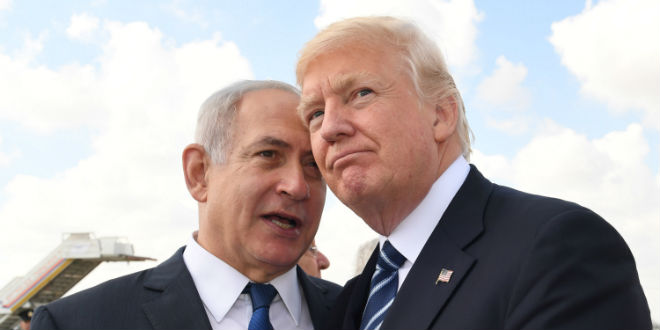At a press conference on Monday held during his visit to attend the inauguration of Brazil’s new President, Prime Minister Benjamin Netanyahu told the media that the White House would release the details of the long-awaited Israel-Palestinian peace plan when it had the greatest chance of success, “and in their estimation elections are the time when it will have the least chance of succeeding.”
The Israeli government is parliamentary with the dominant party forming a coalition of several smaller entities after the elections. Netanyahu explained that presenting the president’s peace plan before the election may make forming a coalition overly difficult adding another major consideration into the decision of the parties over whether to join it.
“It is their calculation — and I am not sure they are wrong — that allowing a discussion about the peace plan after the elections in Israel is better than having such a discussion before an election when the whole debate will be totally different,” Netanyahu told reporters in Rio De Janeiro.
The Israeli elections were scheduled to be held in November 2019 however Defense Minister Avigdor Liberman (Yisrael Beiteinu party) quit his post and left the coalition over a disagreement with the Prime Minister concerning the ceasefire with Hamas after the last wave of rockets in November. This and other coalition complications led Netanyahu to call for early elections on April 9.
Last week, Hadashot news’s diplomatic analyst Dana Weiss tweeted that Trump agreed to Netanyahu’s request to delay the peace plan.
“The US would like to see Bibi [Netanyahu] reelected and understands that the plan, which calls for the division of Jerusalem, would be ammunition for [Jewish Home party chair and Netanyahu rival] Naftali Bennett to attack the PM,” she tweeted.
In contrast to the belief that Trump’s peace initiative will be delayed, Debka File, an English language Israeli military intelligence website, published an exclusive report stating that President Trump requested from his friend and ally, Israeli Prime Minister Benjamin Netanyahu, that he focus his campaign in the national elections on the yet-to-be-revealed presidential plan.
Debka File outlined three reasons the U.S. President would want Netanyahu to do so:
- Making it a central feature of Netanyahu’s campaign would reuse the general election as a kind of referendum for its popular endorsement.
- Building a new coalition cabinet after the vote could be a drawn-out process consuming several months.
- As a focal of the prime minister’s bid for re-election, the plan would fit in well with his plans for visits in the critical months of February and March of a string of world leaders, including Arab heads of government, to showcase his successes as minister of foreign affairs and defense. Trump believes that knowing the peace plan for the Palestinians was imminent would provide Arab leaders, especially in the Gulf, with an added incentive to make state visits to Israel or invite Netanyahu to visit their capitals.
Debka File reported that some of Trump’s advisers requested that the plan be revealed in stages with the more volatile sections being revealed after a coalition is formed.
Despite political interests that seem to be at odds, the concern and consideration being shown by Netanyahu’s government and the White House for each other’s interests stand in sharp contrast to the previous election three years ago.
Two weeks before the last Knesset elections in 2015 Netanyahu addressed a joint meeting of the U.S. Congress. He spoke out against President Obama’s deal with Iran concerning their nuclear program. Obama refused to meet with Netanyahu while he was in Washington.
“As a matter of long-standing practice and principle, we do not see heads of state or candidates in close proximity to their elections, so as to avoid the appearance of influencing a democratic election in a foreign country,” White House spokeswoman Bernadette Meehan said at the time.
It should be noted that a bipartisan Senate inquiry in July 2016 revealed that the Obama administration funneled $350,000 into V15, an NGO focused on unseating Netanyahu in those elections. The committee found no wrongdoing but committee member Senator Rob Portman (R-Ohio) had harsh words for the State Department’s involvement in the Israeli election.
“The State Department ignored warning signs and funded a politically active group in a politically sensitive environment with inadequate safeguards,” he said to Politico. “It is completely unacceptable that U.S. taxpayer dollars were used to build a political campaign infrastructure that was deployed — immediately after the grant ended — against the leader of our closest ally in the Middle East.”
Source: Israel in the News

